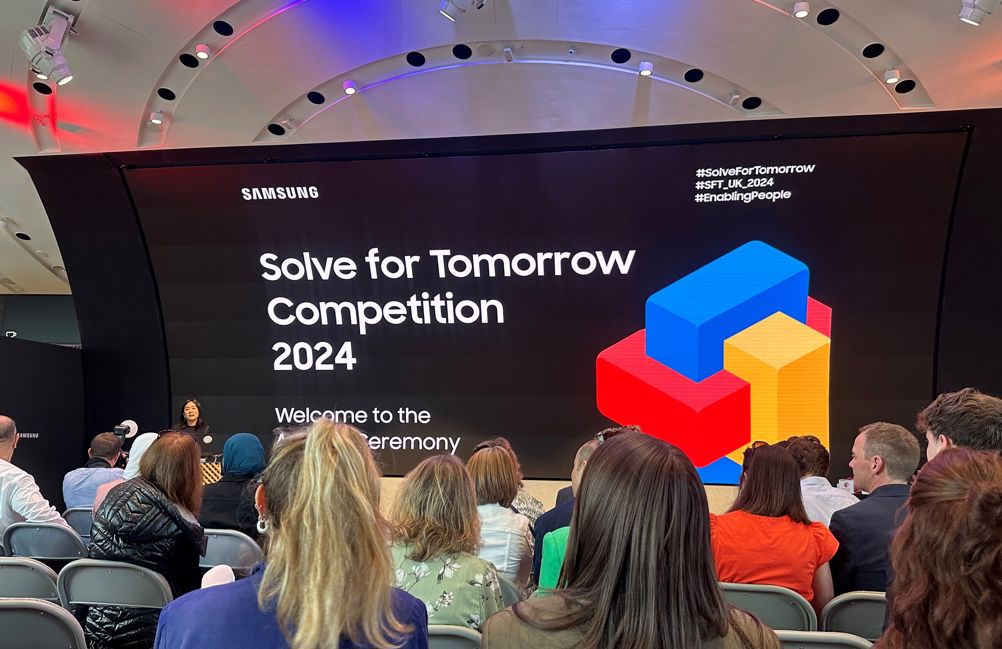Samuel Mo (16) and Dexter Rigby (17) of team Optimum were announced as the winners of the 16-18 category, while Anjali Benny Devadasan and Yu Gu of team Treeva, both 22, placed first in the 18-25 category.
Both teams were awarded £10,000, alongside an additional three months of Samsung mentoring and support, to further their ideas.
Team Optimum’s winning submission was a mobile app that uses AI to schedule when smart devices need to use their energy. When scheduled, the app also helps ensure the energy is from renewable sources, helping to phase out fossil fuels on a wider scale.
Treeva has created a windmill style device that can generate energy from passing vehicles on roads to provide affordable, reliable power and help create safe net zero transport systems.
Samsung said that this year’s programme focused on themes of education, health and wellbeing, equity, diversity and inclusion (EDI), and sustainability. Originally judged by a panel of Samsung colleagues and tech-for-good founders, nearly 600 applicants from across the country were whittled down to a shortlist of 24 teams in January.
The shortlisted submissions included an idea for AI assisted smart glasses, a wearable device to improve the quality of life for stroke victims and a home communication device to reduce loneliness.
The programme also aimed to encourage people from diverse backgrounds to pursue their passion for technology. Samsung said 59 per cent of entries were from BAME or mixed ethnic backgrounds, and 60 per cent of the final 24 were female - a 21 per cent uptick from the previous year.
These 24 teams took part in six weeks of design thinking, market research and a physical and digital prototyping workshops to bring their designs to life. Led by industry experts, teams were guided with additional support from one-to-one Samsung mentoring.

Ten finalists were chosen for the penultimate stage, undertaking three weeks of further training on pitching and funding for their potential businesses. Finally, a panel of senior Samsung representatives and external experts selected the category winners following an in-person pitch and presentation day.
Speaking at the awards ceremony, hosted at the Samsung KX building in London on June 19, Soohyun Jessie Park, head of Corporate Social Responsibility at Samsung Electronics UK, said: “Solve for Tomorrow, now in its fourth year in the UK, has alumni of more than 2.6 million young people in 60 countries around the world, which is quite hard to believe.
“Equipping the next generation with the skills, connections and confidence to succeed is what we set out to achieve every year, because we believe in the power of combining technology with causes that young people care about.
“Congratulations to Anjali, Yu, Samuel and Dexter, for winning, as well as all our participants who entered. We’ll be back next year, and we can’t wait to see another set of outstanding ideas take a step closer to reality.”
In a statement, Anjali Benny Devadasan, team Treeva, said: “The inspiration for our entry is close to my heart as we were inspired to help mitigate climate change after my family were affected by flash floods in Kerala. It means a lot to be able to push forward our idea to generate energy from passing cars. We both have a background in engineering, so we can’t wait to progress this idea further and, with this prize, we'll be able to start working on pilots and with different transport companies. This amazing support will help us turn the idea we had into a reality.”
Samsung said that, through its partnerships with InnovateHer and the Social Mobility Foundation, it aims to encourage more young people that aren’t currently in education, employment or training, to engage with the Solve for Tomorrow programme.
Entries for next years’ competition will open in early October, and more information can be found here.











Comment: Autonomous construction requires open data standards
The UK is particularly well served with topographic data thanks to the Environment Agency´s LIDAR programs, specifically the composite digital terrain...